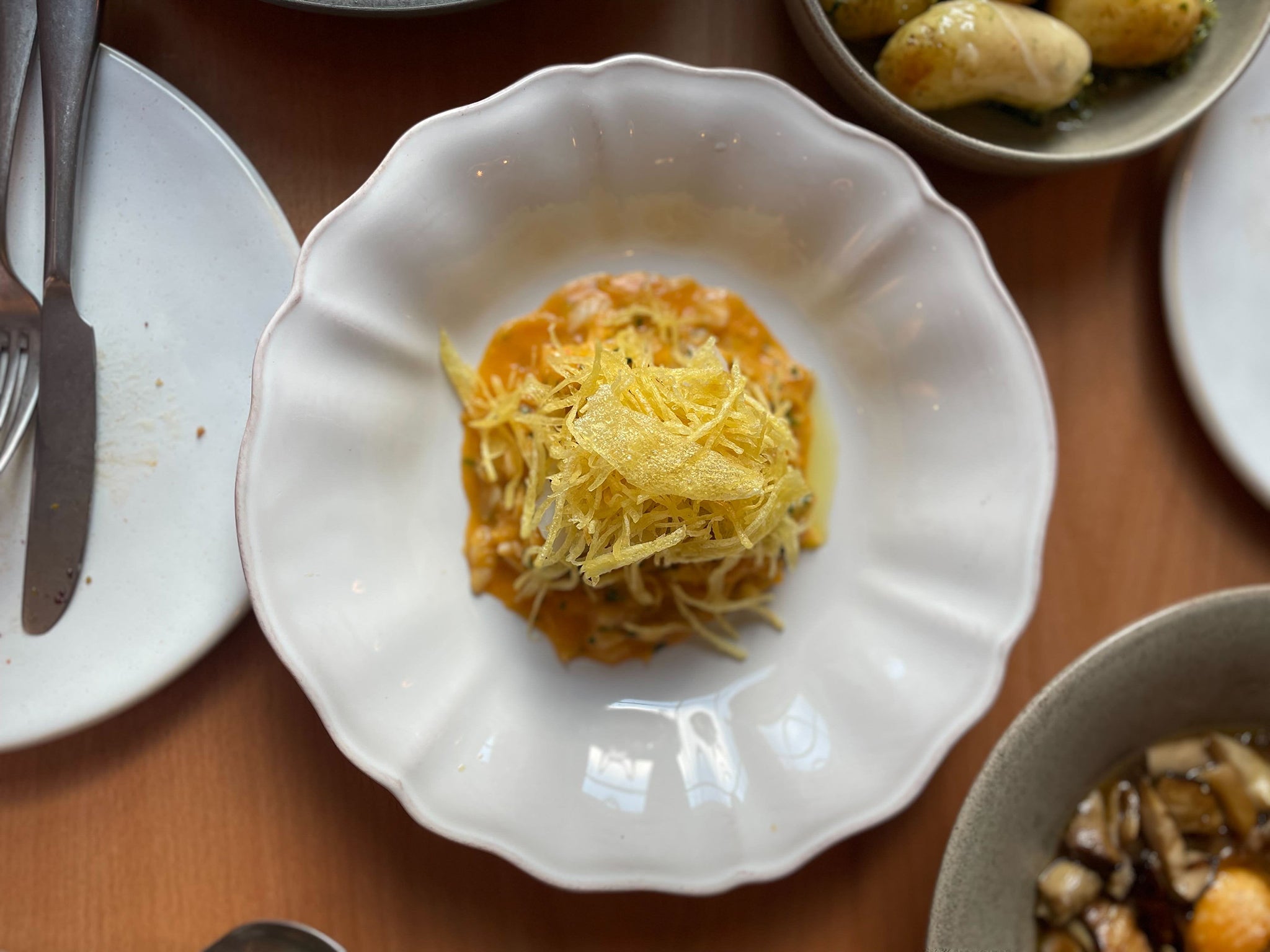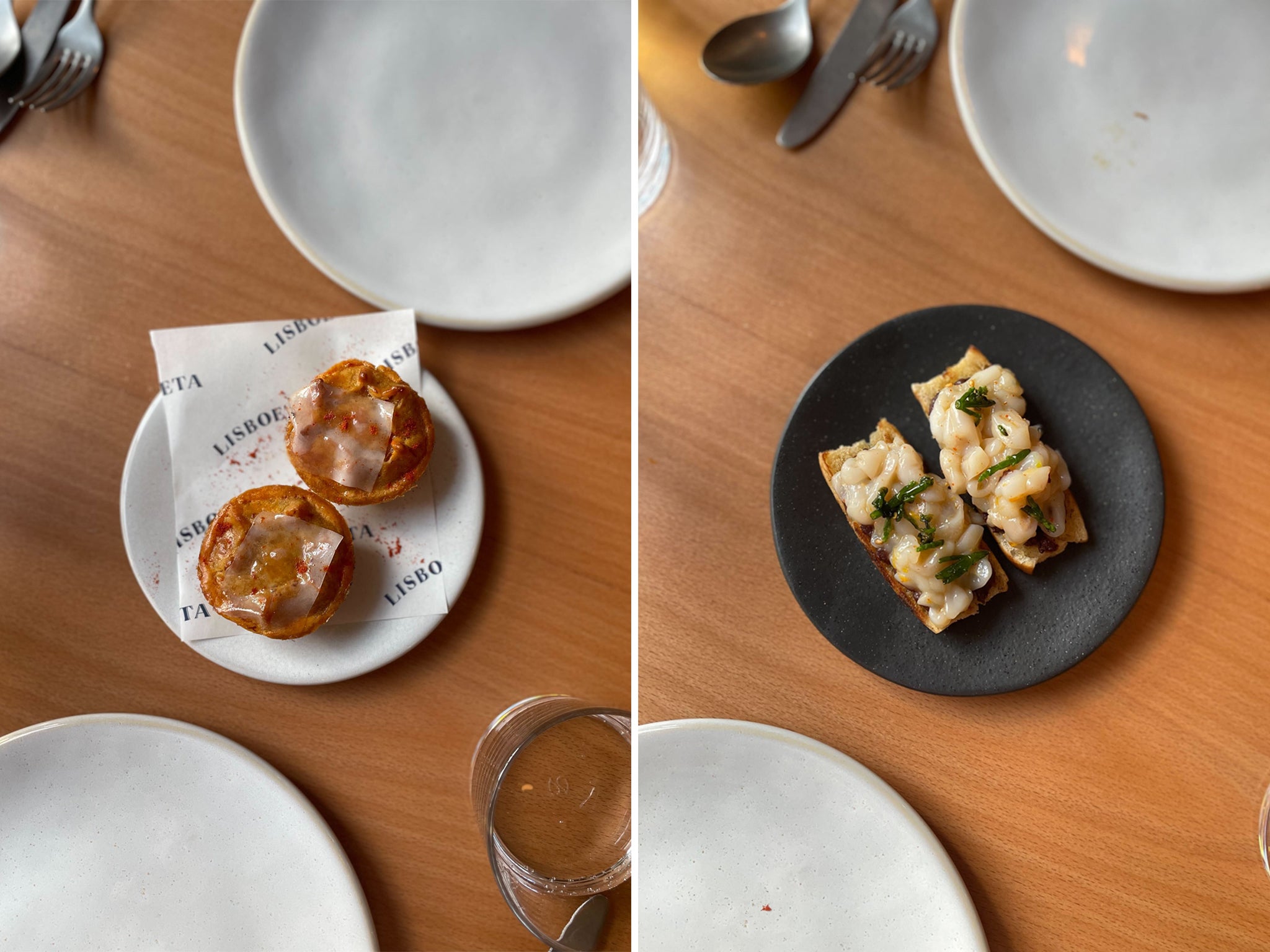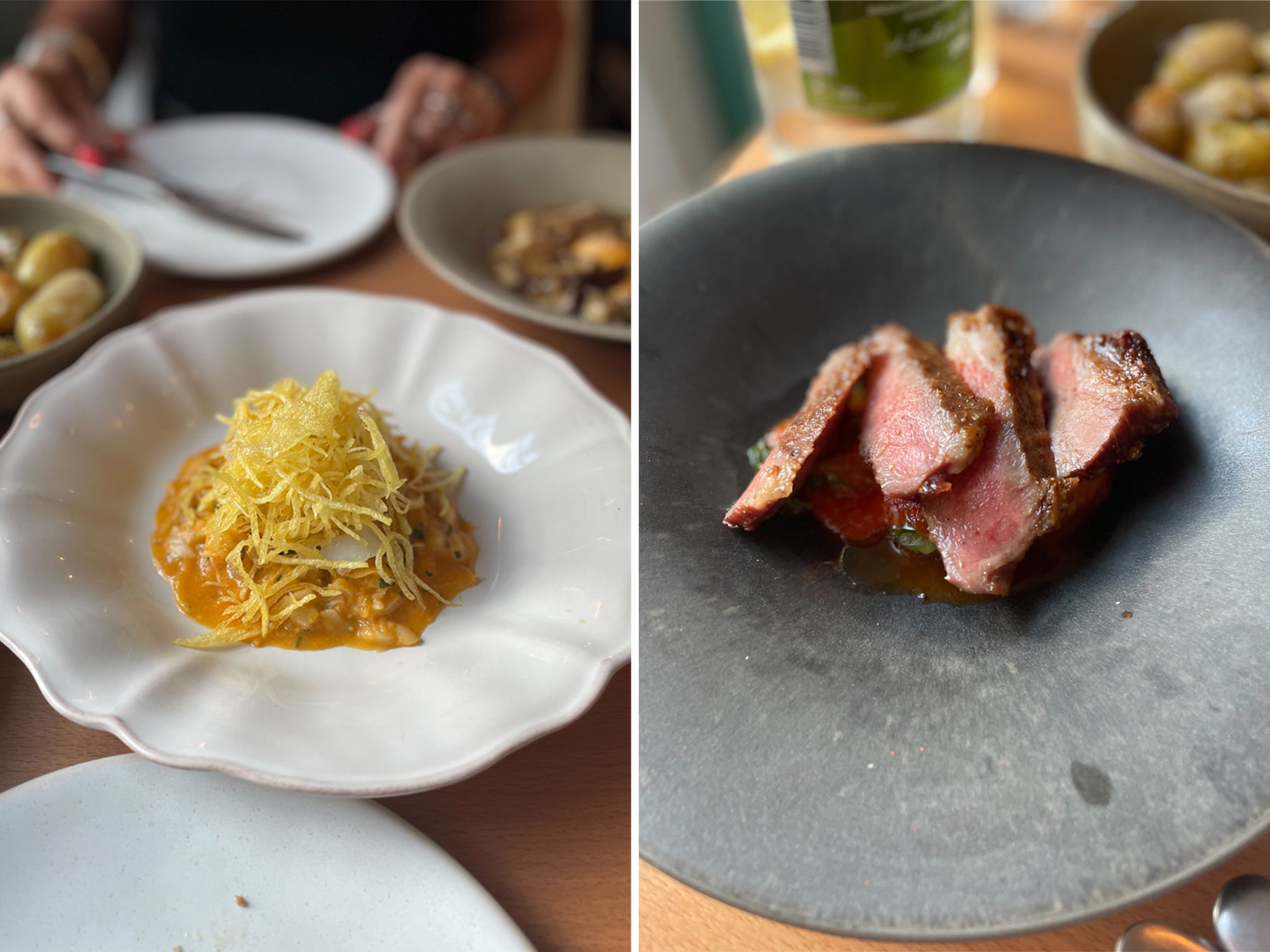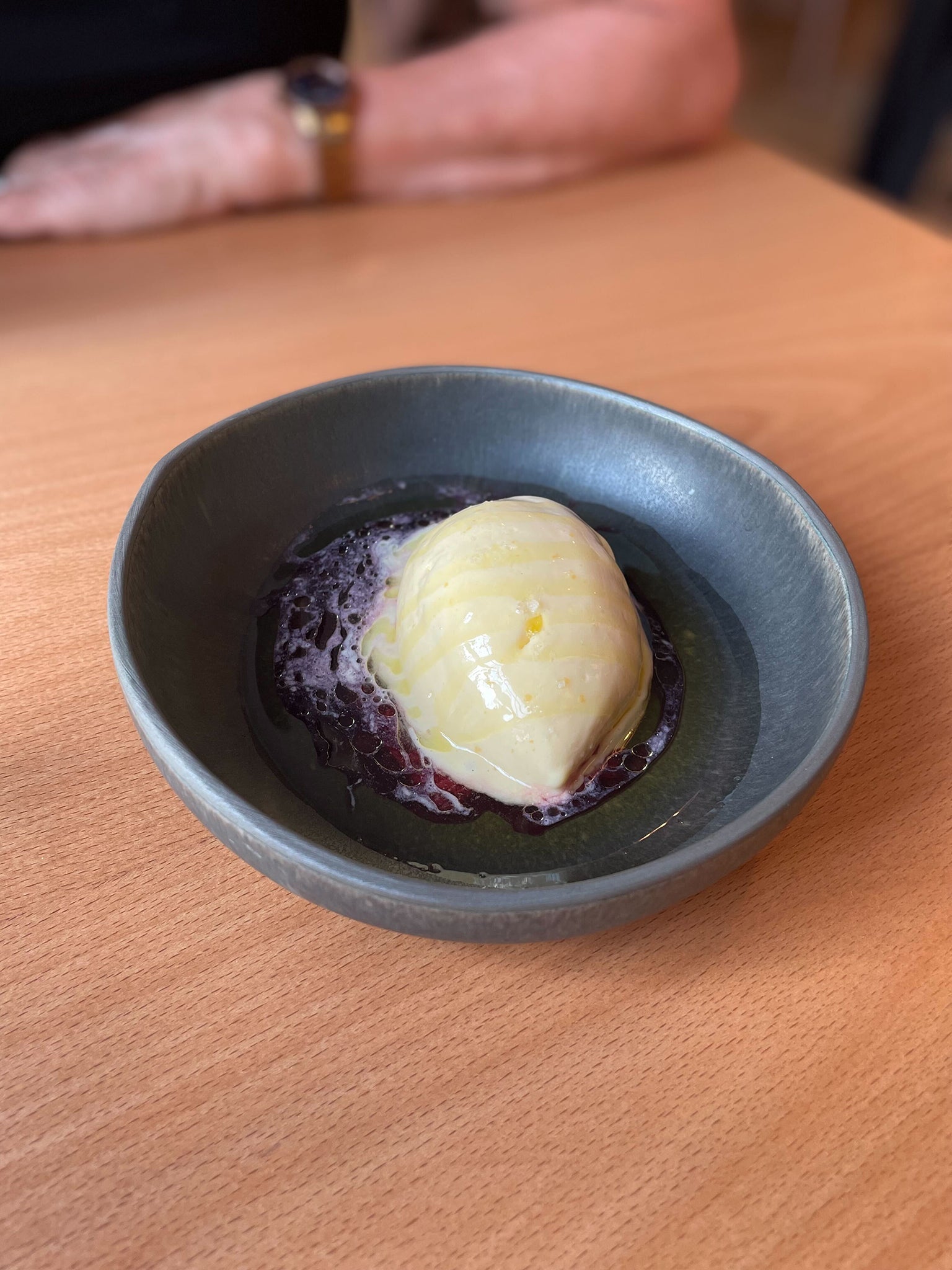Lisboeta: Nuno Mendes’ little slice of Lisbon might surprise you
If you think you know traditional Portuguese food, think again. Dinner at Nuno Mendes’s newest venture is never what you expect, writes Hannah Twiggs


Your support helps us to tell the story
From reproductive rights to climate change to Big Tech, The Independent is on the ground when the story is developing. Whether it's investigating the financials of Elon Musk's pro-Trump PAC or producing our latest documentary, 'The A Word', which shines a light on the American women fighting for reproductive rights, we know how important it is to parse out the facts from the messaging.
At such a critical moment in US history, we need reporters on the ground. Your donation allows us to keep sending journalists to speak to both sides of the story.
The Independent is trusted by Americans across the entire political spectrum. And unlike many other quality news outlets, we choose not to lock Americans out of our reporting and analysis with paywalls. We believe quality journalism should be available to everyone, paid for by those who can afford it.
Your support makes all the difference.I’ve come to realise, as my colleague Sean Russell recently so eloquently put it, “dainty things are the most civilised”. Like him, I like small, concentrated coffees, half-pints and tapas. This is probably partly influenced by my mum’s move to Spain some years ago, where tradition – and the heat – necessitates small dishes, small drinks and big conversation. Perhaps it also stems from my indecision when consulting a menu; I want to try a bit of everything, and small plates are the perfect solution. Less is more, and all that.
When my mum came over to the UK to visit recently – after Covid kept us apart for more than a year, she is very enthusiastic (some would say overly, but not I) about a regular programme of enforced family time – I booked us in for some petiscos (Portuguese small plates) at Nuno Mendes’s Lisboeta on Charlotte Street, which opened to much fanfare in March. Mendes has been on the radar for some time, though fate had other ideas about him sticking around for very long. His first stint in London was at the much-remembered Bacchus in Hoxton, a sort of “modernist” gastropub. Then there was The Loft Project, an intimate and experimental supper club he ran out of his flat in Haggerston. He opened his first restaurant, Viajante, in Bethnal Green, in 2010, and it had a successful run, earning a Michelin star in its first year and retaining it until the restaurant closed in 2014.
He also cooked at Chiltern Firehouse in Marylebone, which needs no introduction. In 2018, he opened and then closed the popular Taberna de Mercado in Spitalfields, citing financial difficulties. And yet, wherever he went, hungry crowds of fans came calling. He’s probably known best for two things: a certain fearlessness in the face of stuffy diners in search of the best Instagram photo, and deeply caring about the cooking and the story behind it. Lisboeta marks a bold return to the London restaurant scene, and it’s clear he’s learnt a lot along the way.

A lot of people in the UK think they know Portuguese cuisine, in the same way they think they know Spanish cuisine, when in fact they’re just loosely familiar with an Anglicised slice of it. I often think of it as one of those cuisines that’s difficult to replicate here as it’s so dependent on the freshest local produce, good weather and a certain atmosphere you only get in Mediterranean countries.
Lisboeta, Mendes’ so-called “love letter” to Lisbon, the city he grew up in and calls home, might surprise you: it’s not all tinned sardines and custard tarts. You will find, however, whipped lardo, an awful lot of “black pork from the Alentejo”, egg yolks here and there and a “pork fat custard” dessert. It doesn’t sound all that appealing on the face of it but I’m prepared to buckle up in the search for something authentically Portuguese – or at least something authentically Mendes.
Firstly – obviously – an aperitivo. A friend recommended the white port and tonic cocktail as something refreshing to start, which at first made me baulk: how is fortified wine refreshing? But it couldn’t have been further from my expectations. It was light, and there was a welcoming fruitiness from pear, lemon, pineapple and clementine; paired with bitter tonic, it was not dissimilar to Aperol. Perfectly refreshing – perhaps I will be switching my spritzes from now on, and you can be sure I’ll be stocking up on white port.

Though I am loath to admit it, Instagram influenced our menu choices. First on my hitlist was the Vindalho Empada, a Goan-spiced pork pie. I normally eschew any form of pie as it’s so often too rich, too filling, too disappointing. But out came a baby-sized, beautifully buttery and crusty pastry (no soggy bottoms here) housing a rich pork paste that made the whole thing melt in the middle. It was the thin, almost transparent, slice of lardo on top, though, that had me hooked. One bite and you might miss that extra, porky hit of umami.
I also had my eye on the “Morcela e lingueirao”, Morcela sausage and razor clams on toast – and I’ve been thinking about them ever since. The saltiness of the Morcela, a Portuguese black sausage, and the sprigs of samphire on top cut through the delicate sweetness of the ultra-melty clams. I wanted more, but one or two each is rich enough. It was hard not to linger in the “Snacks, Charcuterie and Cheese” section– indeed, I think I could have dined exclusively out of it. I would have liked to try more of the “black pork of the Alentejo”, of which there are two options in this section, or the sheep’s cheese, but the Petiscos were calling.
I’ve already found my favourite bacalhau on Earth – not in Portugal but in Spain, at Cerveceria Catalana in Barcelona, which also happens to be one of my favourite restaurants on Earth. Their version, bacallà a l’allioli de mel, cod with honey and allioli, is simply divine. Lisboeta’s rendition still makes the list. The Bacalhau à Bras, arguably one of the country’s most well-known dishes, thankfully skips the black olives and instead tops it with a mound of thin slivers of crispy potato – kind of a mix between bacalhau and huevos cabreados (AKA “angry eggs”). It strikes the right balance of creamy and crispy, salty and sweet, and is a simple, but special dish.
We also opted for the pork (black, from the Alentejo, of course) with a fermented red pepper paste, over the bavette steak with pica pau sauce, though a layman might not be able to tell the difference between the meats. Served medium rare and grilled over the open fire downstairs – which you can watch if you sit at the bar – the fillet had a deep, golden crust on the outside, and was ultra-tender and delicately textured on the inside. Meanwhile, the bright and funky pepper paste was spicy and sweet, the perfect balance for the rich and fatty pork.

On the veg front, the smoked Charlotte potatoes were pretty basic, only jazzed up by another layering of that salty lardo film. The mushroom acorda – sourdough bread soaked in mushroom dashi and port wine, with grilled and smoked mushrooms and an egg yolk – was a little too floppy and moist. I wish I’d gone for the grilled asparagus in wild garlic sauce instead, which looked pretty, or perhaps abandoned the veg entirely in favour of the grilled carabineiro, those bright red, enormous prawns. Our choices were surprisingly lacking in seafood for a Portuguese meal.
We didn’t venture into the “Tachos and Travessas”, larger (and more expensive) dishes to share, as we were short on time, but I did find myself gazing in jealousy at neighbouring tables’ lamb chanfana, served steaming in a big clay pot, or the arroz de marisco, Portugal’s answer to seafood paella. We did squeeze in the abade de priscos, the aforementioned dessert with pork fat custard – mostly out of curiosity. I expected it to look and taste like a creme caramel but it was more like a big dollop of amorphous ice cream and was pleasantly sweet and salty. I’m a big advocate for puddings with salt and olive oil, so it was the perfect dessert for savoury lovers like me, though it won’t please everyone.
For something more broadly representative of Portuguese food, you’d be better off at places like Grelha D’Ouro or Bar Douro, but that’s not why you would go to Lisboeta. Mendes describes it as a love letter to his home town and that’s exactly what it is. A slice of his Lisbon. Fans of his idiosyncratic cooking style will come flocking to any new opening regardless, while passersby on London’s Charlotte Street, where Lisboeta rubs shoulders with some of the capital’s trendiest restaurants, will be lured inside by a creative menu (with the occasional misfire) and a sexy setting. If they can get a booking, that is – you’ll need to plan at least a month ahead for dinner, or else eat unfashionably early.
For what it is and where it is, it’s fairly inexpensive, too. A cocktail each, two snacks, three petiscos and one dessert – a fairly light meal due to time constraints – set us back £84, but if you opted for one of the larger sharing dishes, you’d be looking at an additional £40-50 and that’s before you get to the wine, where the prices are pretty standard for London. It suited our speedy, light dinner as much as it would suit a longer, lazier sitting. If I went back – and I would, which I don’t often – I would try a whole different selection of dishes and drinks and probably have a very different experience. If that isn’t a snapshot of the dining culture of Lisbon and Portugal, I don’t know what is.
Lisboeta, 50 Charlotte St, London, W1T 2NG | lisboeta.co.uk | 020 3830 9888
Join our commenting forum
Join thought-provoking conversations, follow other Independent readers and see their replies
Comments